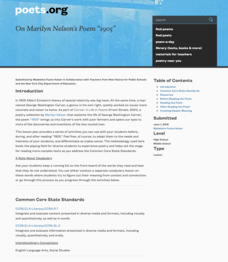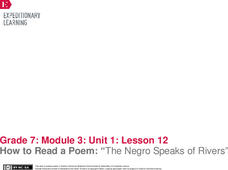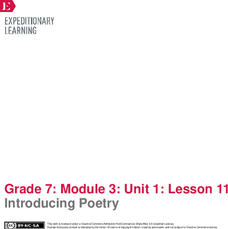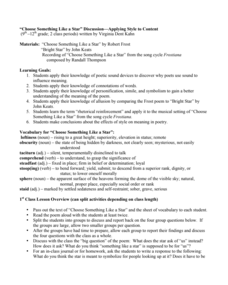Academy of American Poets
On Marilyn Nelson's Poem “1905”
Marilyn Nelson's poem, "1905," asks young scholars to compare and contrast George Washington Carver and Albert Einstein. After studying images of the two scientists and listing their observations, class members listen to several readings...
PBS
Discuss 22-year-old Amanda Gorman’s inaugural poem “The Hill We Climb”
Two poems by National Youth Poet Laureate Amanda Gorman are spotlighted in a PBS lesson. Young scholars conduct a close reading and watch videos of Gorman reading her inaugural poem "The Hill We Climb" and "The Miracle of Morning." They...
Academy of American Poets
Teach This Poem: "Black Laws" by Roger Reeves
After investigating the Black Lives Matter movement, class members do a close read of Roger Reeves' "Black Laws." They write down words and phrases that rhyme, consider the kinds of rhymes used and their function in the poem. Scholars...
EBSCO Industries
Music and Poetry
Song lyrics, like poems, are meant to be heard. After examining the literary devices in several poems, scholars examine the lyrics of popular songs and identify the sound devices and the figurative language writers use to create the...
University of British Columbia
Pondering Poetry and Playing with Words
First-year High school scholars explore the world of poetry with an 11-lesson unit that examines a range of poetry forms and tries their hand at crafting their own poems. Young poets then collect their work in a portfolio that they...
Teaching Tolerance
Poetry and Storytelling Café
Academics take turns as actors in an engaging poetry cafe. Elementary learners work in small groups to create original poems or stories addressing community issues and read their work in front of a live audience. Scholars also reflect...
EngageNY
Poetic Tools in Narrative of the Life of Frederick Douglass
Scholars listen to a reading and answer probing questions about If We Must Die by Claude McKay. Readers annotate their personal copies of the poem as they discuss its figurative language, vocabulary, and meaning. They then transfer their...
EngageNY
How to Read a Poem: “The Negro Speaks of Rivers”
Learners listen as a teacher models how to read a poem using The Negro Speaks of
Rivers. They use the How to Read a Poem anchor chart to help guide their thought process on how a poem requires different reading than other text. While...
EngageNY
Introducing Poetry
A silent reading session permits class members to meet individually with their teacher to discuss their text. Learners then discuss and express their observations about two poetry quotes, recording thoughts about craftsmanship, forms of...
Poetry4kids
Playing With Your Food Poem Lesson
What's more fun than playing with your food? Writing a poem about it! A quick and straightforward lesson guides young writers through the steps of writing a funny, well-structured poem about combining sports and food.
Robert Frost Farm
“Choose Something Like a Star” Discussion—Applying Style to Content
Robert Frost's "Choose Something Like a Star" and John Keats' "Bright Star" provide the text for a two-part instructional activity in which class members analyze the effects of style on meaning in poetry. Randall Thompson's song cycle...
Poetry4kids
Personification Poetry Lesson Plan
Scholars take part in two exercises to boost their knowledge of personification. After reading a detailed description and excerpts from famous poems, writers list action verbs and objects then combine words to create a humorous...
Poetry4kids
Onomatopoeia Poetry Lesson Plan
Two exercises boost scholars' knowledge of a onomatopoeia with excerpts from famous poems. In exercise one, participants circle onomatopoeia words. Exercise two challenges writers to choose three words to use in an original poem.
Poetry4kids
How to Write an Alliteration Poem
Learners follow five steps to compose an alliteration poem. They choose one consonant and brainstorm as many nouns, verbs, and adjectives they can think of to create rhyming sentences that come together in a poetic fashion.
PBS
Using Video to Create Setting and Mood
Writers have long used words, the sound of words, and the images created by their words to describe the setting and establish the mood of their stories. To gain a more in depth understanding of how settings can be used to develop a...
California Federation of Chaparral Poets, Inc
Poetic Devices
Have everything you need to know about the elements of poetry with a nine-page handout. Split into four categories—word sounds, meanings, arrangement, and imagery—budding poets may reference terms, read definitions, descriptions, and...
Santa Ana Unified School District
Early American Poets
The poems of Walt Whitman and Emily Dickinson are the focus of a unit that asks readers to consider how an artist's life and changes in society influences his or her work. After careful study of Whitman's and Dickinson's perspectives on...
Soft Schools
Onomatopoeia
Drip drop goes the raindrop. Quack quack goes the duck. What other words have sounds? Reinforce the concept of onomatopoeia in a worksheet in which young poets identify animal sounds and items that make a given sound.
abcteach
Dragon Alliterations
You don't have to slay the dragon in this activity. Young writers review poetic devices with a set of worksheets about alliteration and similes. Once they finish waxing poetic about their dragon friends, they craft a final acrostic poem.
Welcome to Ms Bosello's Class!
Alliteration Worksheet
Alliteration and imagery are two vital parts of any well-written poem. Encourage your young poets to include these devices with a set of activities designed to get them thinking, writing, and creating.
K12 Reader
Adding Alliteration to Poetry
Alliteration can make the language of a poem flow. Add adjectives to several blanks in two poems to form alliterative phrases.
K12 Reader
Alliteration: It’s a Zany Zoo!
Elephants eat and cheetahs chase in this zany zoo! Kids survey a list of ten animals before adding in an adjective and verb for each to form an alliterative phrase or sentence.
K12 Reader
Warm Up to Alliteration!
How can you tell if a sentence has alliteration? Use a short worksheet to help kids identify examples of alliteration, complete sentences to create alliteration, and use nouns to write their own alliterative sentences.
K12 Reader
Adventures with Alliteration! - Nouns
Create poetry with a worksheet based on alliterative phrases. After reviewing ten nouns, kids add an adjective to each based on the first letter of the noun. They then rewrite five sentences to involve more alliteration.

























